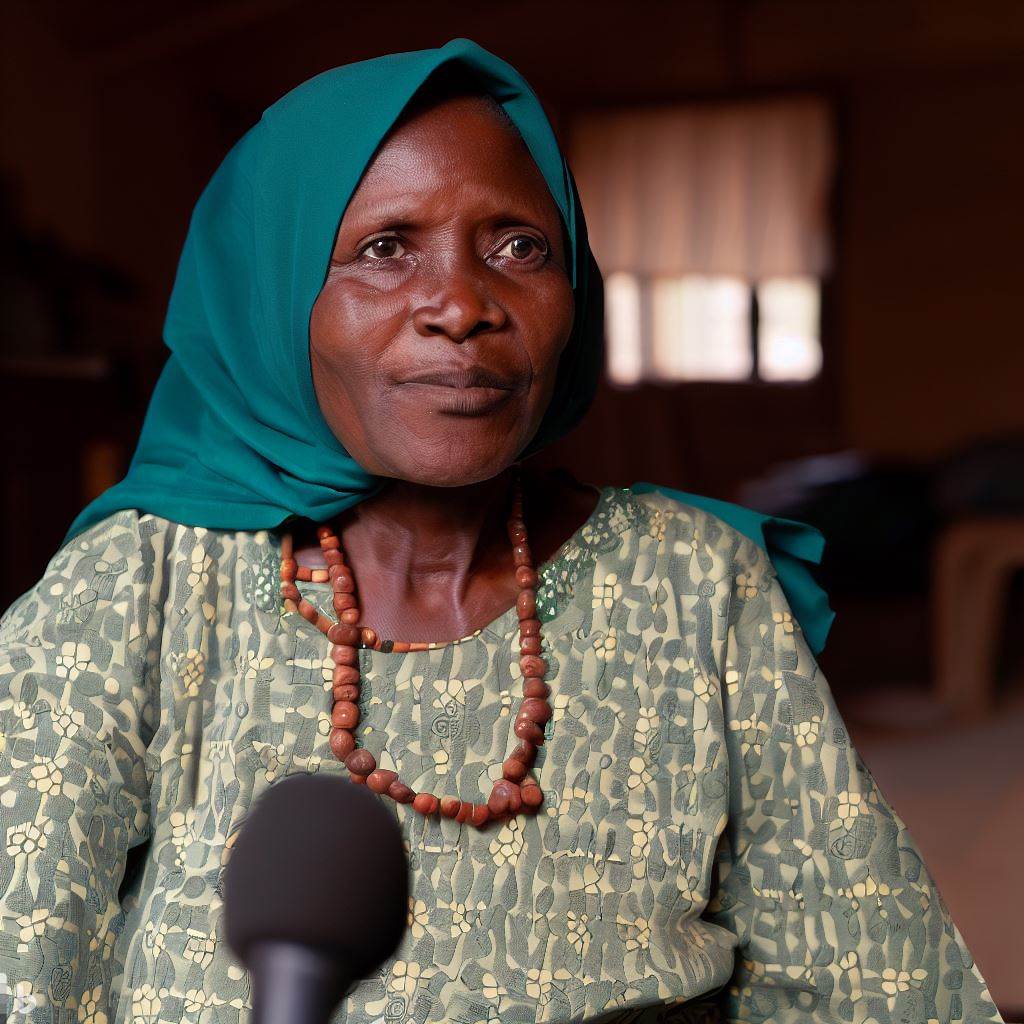Introduction
Brief Overview of the Topic
Understanding the daily life of a Nigerian Home Health Aide (HHA) is crucial for several reasons. HHAs play a vital role in providing care and support to patients in their homes, particularly the elderly, disabled, or those recovering from illness or injury.
By gaining insight into the challenges and responsibilities faced by Nigerian HHAs, we can appreciate their dedication and the impact they have on individuals and communities.
In Nigeria, where access to healthcare facilities may be limited in certain areas, HHAs are often the primary caregivers for those in need.
They assist with daily activities such as bathing, dressing, and preparing meals, as well as administering medication and monitoring patients’ vital signs.
Their compassionate presence ensures that patients receive the necessary care in the comfort and familiarity of their own homes.
Additionally, understanding the daily life of a Nigerian HHA can shed light on the economic and social aspects of this profession.
Many Nigerians choose to become HHAs due to limited job opportunities in other sectors.
By examining their routine and experiences, we can better appreciate the challenges they face in balancing work and personal life.
Moreover, recognizing the importance of this profession fosters a greater appreciation for the contributions made by HHAs to society.
Their dedication and commitment to improving the quality of life for others should not go unnoticed.
By highlighting their work, we can encourage support and advocacy for improving the conditions and recognition of Nigerian HHAs.
In the following sections, we will delve deeper into the daily life of a Nigerian HHA, exploring their responsibilities, challenges, and rewards in more detail.
Through this exploration, we hope to promote a better understanding of their role and inspire respect for their invaluable service.
Background on Nigerian Home Health Aides (HHAs)
Definition and role of an HHA
Home Health Aides (HHAs) are trained caregivers who provide assistance to individuals with disabilities or chronic illnesses in their own homes.
They typically help with activities of daily living, such as bathing, dressing, meal preparation, and medication reminders.
Transform Your Career in Nigeria
Discover unmatched expertise with our personalized Career Consulting service. Navigate Nigeria’s job market with a strategy tailored just for you.
Get StartedGrowing demand for HHAs in Nigeria
The need for home health care services in Nigeria has been steadily increasing due to several factors.
Firstly, the aging population in the country has resulted in a greater demand for caregivers to help seniors live independently.
Additionally, there is a rising prevalence of chronic diseases in Nigeria, which requires ongoing support and care for patients.
Lastly, the COVID-19 pandemic has highlighted the importance of home-based care as a safer alternative to institutional settings.
Challenges and opportunities in the HHA profession
The HHA profession in Nigeria faces various challenges, including a lack of standardized training and certification programs.
Many HHAs receive informal training or learn on the job, which may lead to inconsistent quality of care.
Furthermore, the profession is often undervalued, resulting in low wages and a lack of benefits for caregivers.
However, there are also opportunities for growth and improvement in the HHA sector.
There is a need for government support to establish regulatory frameworks, training programs, and better job opportunities for HHAs.
By investing in the HHA profession, Nigeria can improve the quality of care for its vulnerable populations and create employment opportunities.
Day in the Life of a Nigerian HHA
Morning
A Nigerian HHA begins their day by waking up early and preparing for their first client visit. They travel to the client’s home, carrying all necessary supplies and equipment.
Upon arrival, the HHA greets the client and assesses their needs for the day. They assist the client with personal hygiene tasks, such as bathing, grooming, and getting dressed.
The HHA prepares a nutritious breakfast for the client, considering any dietary restrictions or preferences.
Afternoon
After breakfast, the HHA administers medications to the client according to the prescribed schedule. They engage the client in various activities to promote mental stimulation and social interaction.
The HHA also helps with light housekeeping tasks, such as tidying up and doing laundry. If needed, they may accompany the client to medical appointments or run errands on their behalf.
Throughout the afternoon, the HHA ensures the client’s comfort and safety, monitoring their condition and addressing any concerns.
Evening
As evening approaches, the HHA prepares a nutritious dinner for the client, following any dietary restrictions. They assist with feeding if necessary and clean up the kitchen after the meal.
The HHA engages the client in relaxing activities and helps them wind down before bedtime. Before leaving, the HHA ensures that the client’s environment is safe and secure for the night.
They document the day’s activities and any notable changes in the client’s condition, ensuring clear communication with other healthcare professionals involved in the client’s care.
Being a Nigerian Home Health Aide (HHA) is a demanding yet rewarding profession.
HHAs play a crucial role in assisting individuals with disabilities or chronic illnesses to live independently and improve their quality of life.
While there are challenges in the profession, such as the lack of standardized training and low wages, there are also opportunities for growth and improvement.
By recognizing the importance of HHAs and investing in their training and support, Nigeria can enhance the care provided to its vulnerable populations and create meaningful employment opportunities in the healthcare sector.
Read: Balancing Work and Life as a Home Health Aide in Nigeria
Publish Your Professional Profile, Business or Brand
Showcase your expertise, gain trust, and boost visibility instantly on Professions.ng.
Publish NowQualifications and Training
Home Health Aides (HHAs) in Nigeria are required to meet certain education and certification requirements in order to provide professional care and support to patients.
These qualifications ensure that HHAs have the necessary skills and knowledge to carry out their responsibilities effectively.
Education and Certification Requirements for HHAs in Nigeria
Completion of at least a secondary school education is typically required to become a certified HHA.
Obtaining a certification as a Home Health Aide is essential and can be obtained through recognized training programs.
The certification process involves both theoretical coursework and practical hands-on training. HHAs must pass a competency examination administered by a recognized certification body.
Training Programs and Professional Development Opportunities
There are various training programs available in Nigeria that provide comprehensive education and training for aspiring HHAs.
These programs equip individuals with the necessary skills to provide quality care and support to patients in their homes.
Training programs cover topics such as basic healthcare techniques, personal care, nutrition, and first aid.
HHAs receive training on how to assist patients with daily activities, including bathing, grooming, and medication management.
Professional development opportunities, such as workshops and seminars, are also offered to help HHAs enhance their knowledge and skills.
These programs provide HHAs with the opportunity to stay updated with the latest developments in healthcare.
Importance of Ongoing Training and Skill Enhancement
Ongoing training and skill enhancement are crucial for HHAs as they work in a rapidly evolving healthcare environment.
Continuous learning enables HHAs to provide the best possible care to their patients and adapt to new challenges and advancements in the field.
New healthcare techniques and technologies are constantly emerging, and HHAs need to stay informed and trained to utilize them effectively.
Regular training helps HHAs improve their communication skills, enabling them to establish better rapport with patients and their families.
HHAs also receive training on cultural sensitivity, understanding the diverse needs of patients, and respecting their beliefs and values.
Continuous professional development allows HHAs to constantly upgrade their knowledge and stay up to date with best practices in patient care.
In fact, becoming a qualified HHA in Nigeria requires meeting specific education and certification requirements.
Training programs and professional development opportunities play a crucial role in equipping HHAs with the necessary skills and knowledge to provide quality care.
Ongoing training and skill enhancement are essential for HHAs to stay abreast of advancements in healthcare and deliver the best possible support to their patients.
Read: Demand for Home Health Aides: A Nigerian Perspective

A Typical Day in the Life of a Nigerian HHA
Start of the day: Morning routine and preparation
Every day, a Nigerian Home Health Aide (HHA) begins their day by preparing themselves for work. They wake up early, freshen up, and get ready to provide quality care to their clients.
Job duties and responsibilities
A Nigerian HHA has a wide range of job duties and responsibilities that revolve around taking care of their clients.
Some of these duties include:
- Assisting clients with personal care: HHAs help clients with activities like bathing, grooming, and dressing, ensuring their personal hygiene is maintained.
- Providing companionship and emotional support: HHAs offer a friendly and supportive presence to their clients, engaging them in conversation and activities to prevent loneliness and improve their well-being.
- Administering medications and following medical instructions: It is crucial for HHAs to follow medical instructions precisely while administering medications to clients, ensuring their safety and well-being.
- Assisting with household chores and meal preparation: HHAs help with light housekeeping duties such as cleaning, laundry, and meal preparation to ensure a safe and comfortable living environment for their clients.
Balancing multiple clients and scheduling challenges
One of the main challenges faced by Nigerian HHAs is balancing multiple clients and their respective schedules.
They must effectively manage their time and prioritize tasks to fulfill all their job duties efficiently.
Work environment and conditions
Nigerian HHAs work in various environments, including clients’ homes, hospitals, and long-term care facilities.
They need to adapt to different settings and provide appropriate care based on the specific needs of each client.
Moreover, Nigerian HHAs face different working conditions, including physical exertion, as they may have to lift or move clients with limited mobility.
They also need to maintain a high level of cleanliness and adhere to safety protocols to prevent infections and accidents.
A typical day in the life of a Nigerian HHA involves starting the day with a morning routine, fulfilling various responsibilities like personal care assistance, companionship, medication administration, and household chores.
They must overcome scheduling challenges and adapt to different working environments and conditions to provide the best care for their clients.
Skills and Attributes of a Successful Nigerian HHA:
- Compassion, empathy, and patience: A successful HHA must genuinely care for their patients’ well-being, understanding and empathizing with their challenges and having the patience to support them.
- Strong communication and interpersonal skills: Effective communication is key in home health care. HHAs must actively listen, understand patient needs, and communicate instructions clearly.
- Physical stamina and resilience: Being an HHA can be physically demanding, requiring assisting patients with mobility and daily tasks.
- Cultural sensitivity and adaptability: Successful HHAs respect and understand diverse backgrounds, providing care that aligns with cultural beliefs.
- Problem-solving and critical thinking abilities: HHAs encounter unexpected situations and must think critically to find solutions.
In summary, a successful Nigerian HHA needs compassion, communication skills, physical stamina, cultural sensitivity, and problem-solving abilities, ensuring quality care and patient well-being.
Read: Cultural Sensitivity in Home Health Care: A Nigerian View
Challenges Faced by Nigerian HHAs
When it comes to being a Home Health Aide (HHA) in Nigeria, there are several challenges that these dedicated professionals face on a daily basis.
From low wages to a lack of job security, their work is far from easy. Let’s take an in-depth look at some of the main challenges faced by Nigerian HHAs:
Low wages and lack of job security
The wages of Nigerian HHAs are often inadequate, considering the demanding nature of their work.
They struggle to make ends meet and provide for their own families. Additionally, job security is a major concern as many HHAs experience frequent layoffs and uncertainty.
Limited resources and inadequate support systems
Nigerian HHAs work in environments where resources and support systems are often lacking.
Publish Your Professional Profile, Business or Brand
Showcase your expertise, gain trust, and boost visibility instantly on Professions.ng.
Publish NowThey may not have access to essential equipment, including medical supplies and mobility aids. Furthermore, they may have limited access to ongoing training and educational opportunities.
Emotional and psychological toll of caring for others
Being an HHA requires providing physical and emotional support to clients. The continuous exposure to other people’s pain and suffering can take a toll on their mental well-being.
Nigerian HHAs often find themselves emotionally drained and may struggle to find support for their own mental health.
Lack of recognition and appreciation for their work
Despite the vital role they play in society, Nigerian HHAs often face a lack of recognition and appreciation.
Their contributions to the healthcare system and the well-being of their clients are often overlooked. This lack of appreciation can lead to feelings of undervaluation and frustration among HHAs.
In essence, Nigerian HHAs face numerous challenges in their daily lives. From the low wages and lack of job security to limited resources and inadequate support systems, their work is filled with obstacles.
Moreover, the emotional and psychological toll of caring for others, combined with the lack of recognition and appreciation, make their job even more demanding.
Despite these challenges, Nigerian HHAs continue to provide essential care to those in need, showcasing their dedication and resilience.
Read: Essential Skills Every Nigerian Home Health Aide Needs
Impact on Clients and Communities
Benefits of Having HHAs for Elderly and Disabled Individuals
- Enhanced daily living activities assistance for elderly and disabled individuals.
- Personalized care and attention provided by HHAs to meet specific needs.
- Improved physical and mental well-being through regular support and companionship.
- Increased independence and ability to remain in their own homes rather than a care facility.
- Reduction in hospital readmissions due to proactive and preventive care.
Importance of Continuity of Care and Strong Relationships
Building a strong bond between clients and HHAs fosters trust and comfort. HHAs develop a deep understanding of each client’s unique needs and preferences.
Continuity of care ensures seamless support, preventing gaps in services and potential health issues.
Long-term relationships enable HHAs to detect changes in clients’ conditions and address them promptly. Emotional and psychological support from HHAs improves overall well-being and quality of life.
Positive Outcomes and Improved Quality of Life
HHAs promote a sense of purpose and engagement, reducing feelings of isolation and loneliness. Clients experience improved physical health through assistance with activities of daily living.
Enhanced mental well-being as a result of emotional support and companionship from HHAs. Increased autonomy due to personalized care plans tailored to clients’ preferences.
Overall improved quality of life by enabling clients to age in place comfortably and happily.
Economic and Social Contribution to the Community
HHAs play a vital role in supporting the local economy by creating job opportunities. By allowing elderly and disabled individuals to remain at home, HHAs reduce the burden on healthcare facilities.
HHAs contribute to community cohesion through their dedicated service and support to vulnerable populations.
Enhancing the social fabric by providing companionship and social interaction to isolated clients. HHAs act as a bridge between communities and healthcare systems, ensuring access to necessary resources.
In general, HHAs have a significant impact on both clients and communities.
Their benefits for elderly and disabled individuals include enhanced daily living support, improved quality of life, and reduced hospital readmissions.
Continuity of care and strong relationships foster trust and enable proactive healthcare.
HHAs also contribute economically and socially to their communities, creating job opportunities and promoting community cohesion.
Their role in supporting vulnerable populations is essential, enhancing the well-being and overall quality of life for those in need.
Read: The Journey to Becoming a Registered Nurse in Nigeria
Conclusion
In summary, this in-depth look at a day in the life of a Nigerian HHA has shed light on the challenges and sacrifices they face.
These healthcare providers work tirelessly to ensure the well-being of their patients, often in difficult conditions.
The key points discussed include the demanding nature of their job, the long hours they work, and the inadequate compensation they receive.
We have also explored the lack of recognition and support for Nigerian HHAs and the need for advocacy to improve their welfare.
To support and advocate for the welfare of Nigerian HHAs, it is crucial to raise awareness about their daily lives and the importance of their work.
This can be done through sharing their stories, supporting initiatives that aim to improve their working conditions, and pushing for policy changes that prioritize their well-being.
Understanding the daily lives of Nigerian HHAs is significant as it showcases the immense contributions they make to the healthcare system.
It highlights the need for better working conditions, fair compensation, and recognition for their invaluable work.
By understanding their struggles, we can work towards creating a better future for these healthcare providers and ensuring quality care for all.
Let us join hands, support Nigerian HHAs, and be advocates for their welfare. Together, we can make a difference in their lives and the lives of the patients they serve.




